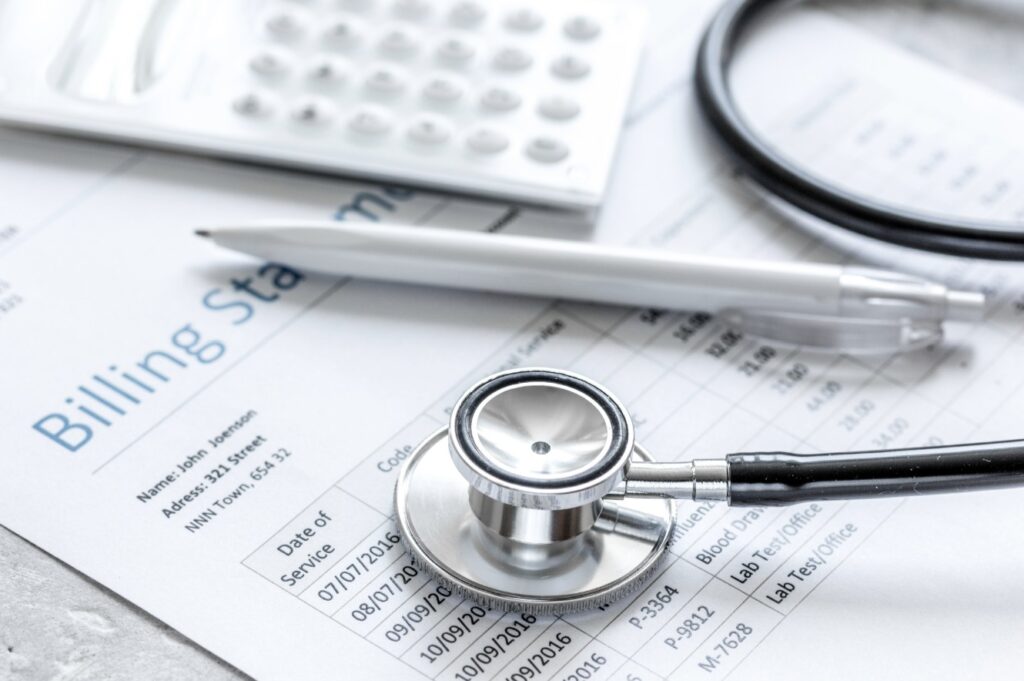
Hospital bills in New Jersey are notoriously complex, and mistakes are far more common than most people realize. It’s estimated that up to 80% of medical bills contain errors. These mistakes can cost patients hundreds – or even thousands – of dollars if they go unnoticed.
The reality is that billing departments are busy, insurance claims are complicated, and the process leaves plenty of room for incorrect charges, duplicate entries, or misapplied insurance payments.
For patients and caregivers already under stress, sorting out these issues can feel overwhelming. An independent Board Certified Patient Advocate like Stevie Kiziukiewicz of Seawind Health Advocacy Group can make all the difference.
Based in Ocean and Monmouth County, Stevie helps clients review bills, identify mistakes, and work with hospitals, doctors, and insurance companies to ensure charges are accurate before any payment is made.
Why Medical Bills Are So Often Wrong
Hospital billing is complicated. Coding errors, duplicate charges, delayed insurance processing, and miscommunications between providers and insurers all contribute to the problem.
Many patients assume bills are accurate simply because they come from a reputable hospital. But large health systems often process thousands of transactions daily – mistakes are not just possible, they’re likely. Without someone to check and challenge them, errors go unnoticed.
The Most Common Hospital Billing Errors in New Jersey
While every situation is unique, certain types of mistakes appear again and again in patient bills. Understanding these common issues is the first step toward protecting yourself from overpaying.
Duplicate Charges
Sometimes a service or procedure is listed twice on a bill. This can happen when multiple staff members document the same treatment, or when hospital systems don’t sync properly. Patients end up being charged twice for the same thing.
Incorrect Patient Information
If your insurance ID number, name, or date of birth is entered incorrectly, your claim can be denied or processed incorrectly. This might result in the hospital billing you directly for charges that should have been covered.
Upcoding
This occurs when a medical provider charges for a more expensive procedure than the one actually performed. While sometimes a result of honest coding errors, upcoding can dramatically increase the total amount you’re billed.
Unbundling
Instead of charging for a bundled service at a lower rate, hospitals sometimes list each component separately, increasing the total cost.
Charges for Canceled Services
If a scheduled test or treatment was canceled, you shouldn’t be billed for it—but these charges sometimes slip through the system.
Insurance Misapplication
Even if your insurance is billed, payments can be incorrectly applied to your deductible or co-insurance. This can lead to you being billed for amounts the insurer should have covered.
Why These Errors Happen So Often
The hospital billing process is complicated. Patient information is entered into multiple systems, codes are used to represent every service, and insurance companies have their own rules for processing claims. A single typo, misunderstanding, or software glitch can lead to major billing mistakes.
In New Jersey, large hospital networks process thousands of claims daily, which means there’s often little time for personalized review. Bills are sent out quickly—sometimes before insurance has even processed the claim – leaving patients to sort through the mess on their own.
The Right Steps to Take Before Paying a Hospital Bill
If you receive a hospital bill, the worst thing you can do is pay it without checking it first. Following a clear process can help you avoid paying for mistakes.
Step 1: Review Your Explanation of Benefits (EOB)
If you have insurance, your EOB is the key document to review. It shows what services your insurance was billed for, how much they paid, and what portion you may owe. Your EOB might arrive in the mail or be available through your insurer’s online portal.
Step 2: Match the Bill to the EOB
Go line by line. Do the services listed on the hospital bill match those on the EOB? Are the dates of service correct? Does the amount the hospital says you owe match the “patient responsibility” listed on the EOB?
Step 3: Look for Red Flags
Some warning signs of potential errors include:
Services you don’t remember receiving.
Charges for a longer hospital stay than you had.
Items listed twice.
Services billed before insurance processed your claim.
Step 4: Contact the Hospital Billing Department
If you find discrepancies, call the hospital billing office. Ask for an itemized bill if you don’t already have one. This will break down each charge and make errors easier to spot.
Step 5: Involve a Board Certified Patient Advocate
If the process feels overwhelming, or if the hospital and insurer give conflicting answers, this is the time to bring in expert help. A patient advocate can speak directly with billing offices, insurers, and providers on your behalf.
How a Patient Advocate Can Help
Stevie Kiziukiewicz is not employed by any hospital or insurance company. She works for you. That independence is key – her only goal is to make sure your bill is accurate, your insurance is applied correctly, and you don’t pay a penny more than you owe.
Here’s how Stevie supports clients dealing with hospital billing problems in Ocean and Monmouth County:
Detailed Bill Review
Stevie examines each charge, compares it to your EOB, and identifies possible coding errors, duplicate entries, or charges for services you didn’t receive.
Communication with Hospitals and Insurers
She contacts billing departments and insurance representatives to dispute incorrect charges and request corrections.
Appeal Support
If your insurance denies a claim that should have been covered, Stevie helps prepare and submit a strong appeal, increasing the chances of a favorable outcome.
Payment Plan Negotiation
If a bill is correct but large, Stevie can help negotiate a fair payment plan so it doesn’t create financial hardship.
Documentation and Tracking
She ensures you have copies of all relevant documents – itemized bills, EOBs, correspondence – and keeps a clear record of the dispute process.
The Real Cost of Not Reviewing Your Hospital Bill
Paying an incorrect bill isn’t just a waste of money – it can also create ongoing problems. Overcharges can lead to inflated insurance premiums, higher out-of-pocket maximums, and even damage to your credit if disputes go unresolved.
In New Jersey, where medical costs are among the highest in the nation, even small errors can have a big financial impact. Taking the time to review your bill—or having a professional do it for you—can prevent unnecessary expenses and stress.

Local Support for Ocean and Monmouth County Patients
While Stevie can consult virtually with clients anywhere, her in-person services are focused on Ocean and Monmouth County, NJ. This local presence means she understands the billing practices of area hospitals, the quirks of regional insurance networks, and the fastest ways to reach the right decision-makers.
Whether you’re recovering from a hospital stay, helping a family member manage care, or dealing with the complexity of Medicare, having a local, Board-Certified Patient Advocate in your corner can save you time, money, and frustration.
When Should You Call Seawind Health Advocacy Group?
If any of the following apply, it’s time to get help:
Hospital billing errors are not rare—they’re the rule rather than the exception. The stakes are high, and navigating the dispute process on your own can be confusing and exhausting. A Board-Certified Patient Advocate like Stevie Kiziukiewicz has the expertise, persistence, and independence to ensure your bills are accurate and fair.
If you’ve received a hospital bill and aren’t sure it’s correct, don’t wait. The sooner errors are caught, the easier they are to fix.
Don’t pay a bill that hasn’t been verified. Let a professional advocate step in before you lose money unnecessarily.
Additional Services Provided By Seawind
Care Coordination and Support
- Create an Individual Plan of Action
- Attend physician appointments with clients
- Provide resources and referrals
- Assist with transitions and moves to care facilities
Financial and Administrative Assistance
- Assist with obtaining and organizing important documents
- Work on medical billing issues
- Medicare/Medicare Advantage plan evaluations
- Assistance with activating long-term care insurance
Healthcare Access and Advocacy
- Obtain therapy services including DME, PT, Speech, OT
- Assist with interviews of in-home caregivers
Power of Attorney, Healthcare Representative, and Executor
Provide compassionate guidance and advocacy for individuals facing complex medical decisions.



